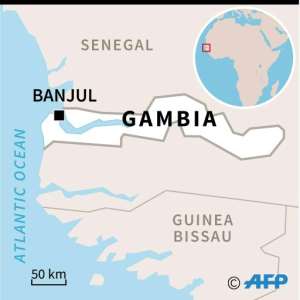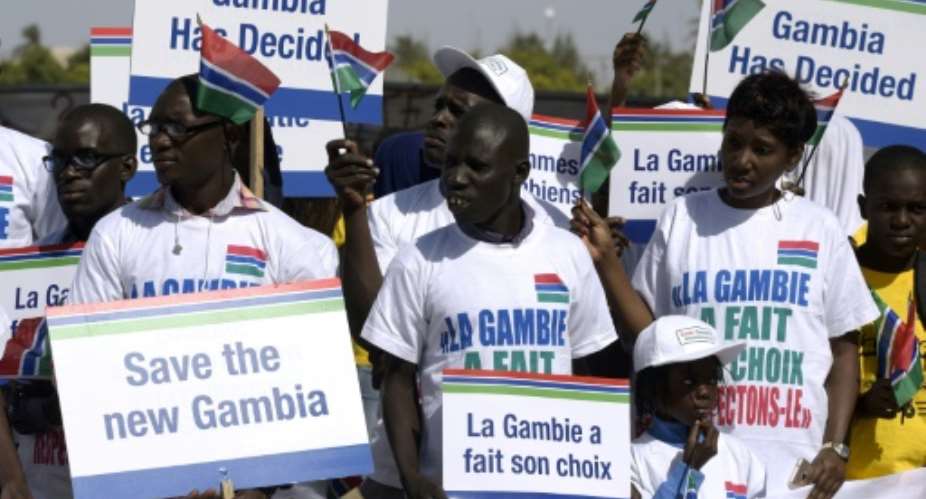Dakar (AFP) - Seven foreign journalists have been barred from entering The Gambia, where President Yahya Jammeh is refusing to quit days before the planned inauguration of his rival Adama Barrow, they said Tuesday.
The journalists -- four from Chinese CGTN television based in Nairobi, two Swedes from the photo agency Kontinent and a Senegalese AFP photographer -- were refused entry Monday evening.
Immigration officers turned them back saying they did not have accreditation, although they had applied in advance and were supposed to pick it up once in the country, according to the journalists.
The small west African country has been plunged into political turmoil since Jammeh disputed Barrow's December poll victory. He is refusing to cede power, so long as a judge has not ruled on his legal challenge.
Barrow is in Senegal, where he plans to remain until the inauguration on Thursday.
By Tuesday afternoon, The Gambia's information ministry had not responded to multiple requests from AFP for clarification.
Information minister Sheriff Bojang was among government members either recently dismissed or who have announced their resignation, as Jammeh comes under intense international pressure to cede power to Barrow on January 19, at the end of his official mandate.
Bojang, who had held office for two years, was replaced last week by a lawmaker, Seedy Njie.
 Gambia
Gambia
The seven journalists, who arrived on a flight from Dakar, were questioned by immigration officers after stating their profession on a police form, and sent back to Senegal some three hours later.
"There seems to have been a miscommunication between the ministry of information and the immigration guys," said one of the journalists, requesting anonymity.
"They said we didn't have our accreditation although we had applied for one" before travelling to the country, he added. "We were told to come and pay in person."
Another of the journalists said immigration officers said they had no information about them, so they could not enter the country. "We were not trying to sneak into the country."
Three Senegalese journalists were detained on January 10 in Banjul, where they were covering a hearing of the Supreme Court, and expelled from the country.
Their media outlets said the reason given was a lack of accreditation, even though at least one had been accredited to cover the December 1 presidential poll, and had continued to work with the same document without any problems.





 Former Kotoko Player George Asare elected SRC President at PUG Law Faculty
Former Kotoko Player George Asare elected SRC President at PUG Law Faculty
 2024 elections: Consider ‘dumsor’ when casting your votes; NPP deserves less — P...
2024 elections: Consider ‘dumsor’ when casting your votes; NPP deserves less — P...
 You have no grounds to call Mahama incompetent; you’ve failed — Prof. Marfo blas...
You have no grounds to call Mahama incompetent; you’ve failed — Prof. Marfo blas...
 2024 elections: NPP creates better policies for people like us; we’ll vote for B...
2024 elections: NPP creates better policies for people like us; we’ll vote for B...
 Don’t exchange your life for wealth; a sparkle of fire can be your end — Gender ...
Don’t exchange your life for wealth; a sparkle of fire can be your end — Gender ...
 Ghana’s newly installed Poland train reportedly involved in accident while on a ...
Ghana’s newly installed Poland train reportedly involved in accident while on a ...
 Chieftaincy disputes: Government imposes 4pm to 7am curfew on Sampa township
Chieftaincy disputes: Government imposes 4pm to 7am curfew on Sampa township
 Franklin Cudjoe fumes at unaccountable wasteful executive living large at the ex...
Franklin Cudjoe fumes at unaccountable wasteful executive living large at the ex...
 I'll 'stoop too low' for votes; I'm never moved by your propaganda — Oquaye Jnr ...
I'll 'stoop too low' for votes; I'm never moved by your propaganda — Oquaye Jnr ...
 Kumasi Thermal Plant commissioning: I pray God opens the eyes of leaders who don...
Kumasi Thermal Plant commissioning: I pray God opens the eyes of leaders who don...
